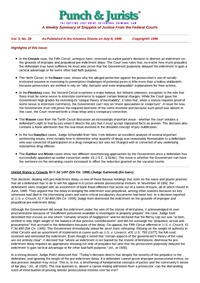Loaded on
July 1, 1996
published in Punch and Jurists
July 08, 1996
The defendant contended that his conviction of money laundering required the court to make a chain of statutory linkages which was so tenuous as to render the laundering statute's application to his case constitutionally infirm. The chain of statutes invoked by the indictment leads from money laundering back to …
Loaded on
July 1, 1996
published in Punch and Jurists
July 08, 1996
This case explores Rule 606(b), which governs jurors’ competency to testify with respect to their
deliberations. After the defendants were convicted at trial, the filed a motion for a new trial on the basis
of one juror’s affidavit that the jury had overheard, during numerous bench conferences, references to
…
Loaded on
July 1, 1996
published in Punch and Jurists
July 08, 1996
This case covers a number of important sentencing issues that followed the conviction of two defendants for conspiracy to possess and distribute cocaine. One of the defendants (named Chalarca) was not even charged with any substantive offense. He was merely driving his cousin, Sanchez, to a meeting to deliver …
Loaded on
July 1, 1996
published in Punch and Jurists
July 08, 1996
While the companion case to this case dealt primarily with the quantity of drugs attributable to a conspirator who was not charged with any substantive violation, this decision is noted because Judge Scheindlin, over strong Government opposition, ruled that the defendant qualified for the "safety valve" benefits of 18 …
Loaded on
July 1, 1996
published in Punch and Jurists
July 08, 1996
Case held that the provisions of Fed.R.Crim.P. 11(e)(6) protecting statements made during plea negotiations do not apply to statements made after the plea agreement was finalized.
The defendant in this case was charged with several drug counts. He and his counsel ultimately entered into plea negotiations and in …
Loaded on
July 1, 1996
published in Punch and Jurists
July 08, 1996
Although this case does not refer to Rule 410, it does relate to the admissibility of statements made
during plea discussions. The defendant in this case was charged with several drug counts. He and his
counsel ultimately entered into plea negotiations and in that connection he had a meeting …
Loaded on
July 1, 1996
published in Punch and Jurists
July 08, 1996
The defendant in this case pled guilty to making 20 threatening phone calls to a U.S. prosecutor who had previously convicted him on earlier charges. At sentencing, the court overruled the defendant's objection that the threatening phone calls should be grouped because they were all part of the same …
Loaded on
July 1, 1996
published in Punch and Jurists
July 08, 1996
Case held that a brief and inadvertant continuation of a proper courtroom closure, not noticed by any of the trial participants, although not permitted by law, did not rise to a level of a constitutional violation.
Loaded on
July 1, 1996
published in Punch and Jurists
July 08, 1996
Case held that the provisions of Fed.R.Crim.P. 11(e)(6) protecting statements made during plea negotiations do not apply to statements made after the plea agreement was finalized.
Although this case does not refer to Rule 410, it does relate to the admissibility of statements made
during plea discussions. The …
Loaded on
July 1, 1996
published in Punch and Jurists
July 08, 1996
QUOTE OF THE WEEK - More than 100 years ago, Justice Bradley of the Supreme Court wisely admonished against stealthy encroachments into our Constitutional rights with these words:
"It may be that it is the obnoxious thing in its mildest and least repulsive form; but illegitimate and unconstitutional practices …
Loaded on
July 1, 1996
published in Punch and Jurists
July 08, 1996
Here the majority held that where am indictment is not barred by the statute of limitations, dismissal for pre-indictmemt delay requires both actual prejudice and a finding that the Government sought a tactical delay or some other bad faith.
In this case, involving a prosecution for alleged savings …
Loaded on
July 1, 1996
published in Punch and Jurists
July 08, 1996
Here the Court vacated a sentence based on the district court's determination of the quantity of drugs involved because it relied on testimony that was inherently inconsistent - which is "the prototype of unreliable evidence.".
The Court started by recognizing that "the quantity of drugs attributed to a …
Loaded on
July 1, 1996
published in Punch and Jurists
July 08, 1996
Special Feature
A few weeks ago, we read, but decided not to comment on, a Second Circuit case, entitled U.S. v. Gigante, 85 F.3d 83 (2nd Cir. 1996). Upon our initial review of that case, the decision appeared to be reasonable on its face. Since then, we have dug …
Loaded on
March 1, 1996
published in Punch and Jurists
July 08, 1996
This decision explores the scope of Rule 16(a)(1)(A) of the Fed.R.Crim.P., which deals with the rights of an organization, such as a partnership or a corporation, to compel discovery of statements made by employees and agents of the defendant organization during the course of a Government investigation. The Government …
